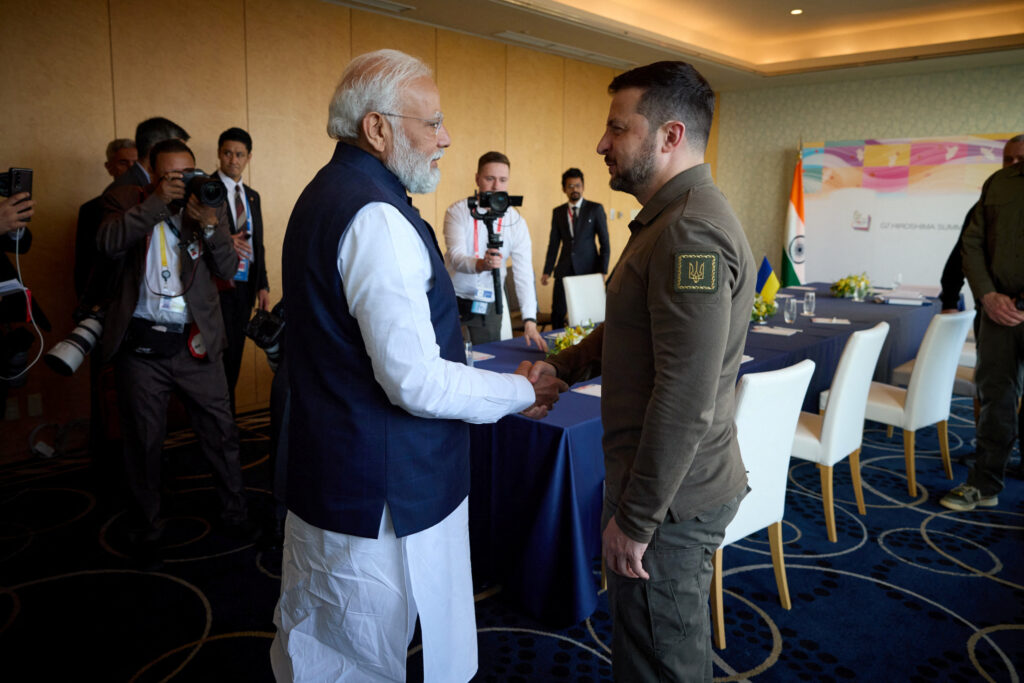On the eve of the BRICS summit, Indian Prime Minister Narendra Modi urged Russian President Vladimir Putin to pursue a peaceful resolution to the ongoing conflict in Ukraine, expressing India’s readiness to support efforts towards a ceasefire. Modi’s remarks highlight India’s diplomatic stance amid Europe’s deadliest conflict since World War II, as the BRICS alliance gains prominence as a counterbalance to Western influence.
Putin, who launched a full-scale invasion of Ukraine in February 2022, aims to use the BRICS summit as a platform to showcase the growing power of non-Western countries. With leaders from 22 nations, including Chinese President Xi Jinping, attending the summit in Kazan, Russia, the group seeks to assert its geopolitical clout. BRICS, representing 45% of the world’s population and 35% of the global economy, is positioned as a key player in reshaping global governance.
During his meeting with Putin, Modi reiterated India’s commitment to facilitating peace talks and ending the war. “We believe that problems should be resolved only through peaceful means,” Modi said, expressing his hope for an “early restoration of peace and stability.” India has maintained open communication with both Russia and Ukraine throughout the conflict, emphasizing humanitarian priorities and peaceful negotiations.
“We fully support the early restoration of peace and stability. All our efforts give priority to humanity. India is ready to provide all possible support in the times to come,” Modi stated, positioning India as a potential mediator in peace talks.
Chinese President Xi Jinping also met with Putin at the summit, where both leaders reaffirmed their commitment to strengthening their strategic partnership amid shared concerns over U.S. influence. Russia and China have increasingly aligned themselves as rivals to the West, countering what they see as American hegemony in international politics.
While specific details of Xi and Putin’s discussions on Ukraine were not disclosed, Kremlin spokesperson Dmitry Peskov confirmed that the crisis was part of their agenda.
The BRICS summit comes at a pivotal moment as the group expands its membership and influence. Countries such as Egypt, Ethiopia, Iran, and the United Arab Emirates have joined the bloc, with Saudi Arabia expected to follow suit. As BRICS grows, its share of global GDP is projected to rise to 37% by 2030, surpassing the economic share of the Group of Seven (G7) major Western economies, which is forecast to drop to 28%.
However, the expansion of BRICS raises concerns about internal divisions, particularly between China and India, and the complex relationships between member states like Iran and its Arab neighbors.
Despite these challenges, BRICS countries, particularly China and Russia, are pushing for an alternative platform for international payments that would be immune to Western sanctions. Russia, facing extensive sanctions from the U.S. and its allies, is keen to build a financial system that bypasses the current Western-dominated frameworks.
Putin, while acknowledging the possibility of peace, made it clear that Moscow will not relinquish control over the regions of eastern Ukraine that it now claims as Russian territory. “We will not trade away the four regions of eastern Ukraine,” Putin said, referring to the areas of Donetsk, Luhansk, Zaporizhzhia, and Kherson, which Russia controls.
Two Russian sources hinted at growing discussions within Moscow about a possible ceasefire, though no concrete plans have emerged. Moscow appears to be waiting for the outcome of the upcoming U.S. presidential election in November, which could potentially shift the West’s approach to the war.
Putin reiterated that the West has come to realize that Russia will prevail in the conflict, though he remains open to resuming negotiations based on ceasefire agreements reached in Istanbul in April 2022.
The BRICS summit, taking place against the backdrop of not only the war in Ukraine but also conflict in the Middle East and a slowing Chinese economy, underscores the group’s rising importance in global geopolitics. The United Arab Emirates, represented by President Sheikh Mohammed bin Zayed Al Nahyan, has played a mediating role in the Ukraine crisis and remains committed to resolving international conflicts.
Though Brazilian President Luiz Inacio Lula da Silva had to cancel his attendance at the summit due to medical reasons, BRICS continues to position itself as a major force in the emerging multipolar world. As the group strengthens its ties, it seeks to provide an alternative to the Western-led international order, challenging the dominance of the U.S. and Europe in global affairs.



